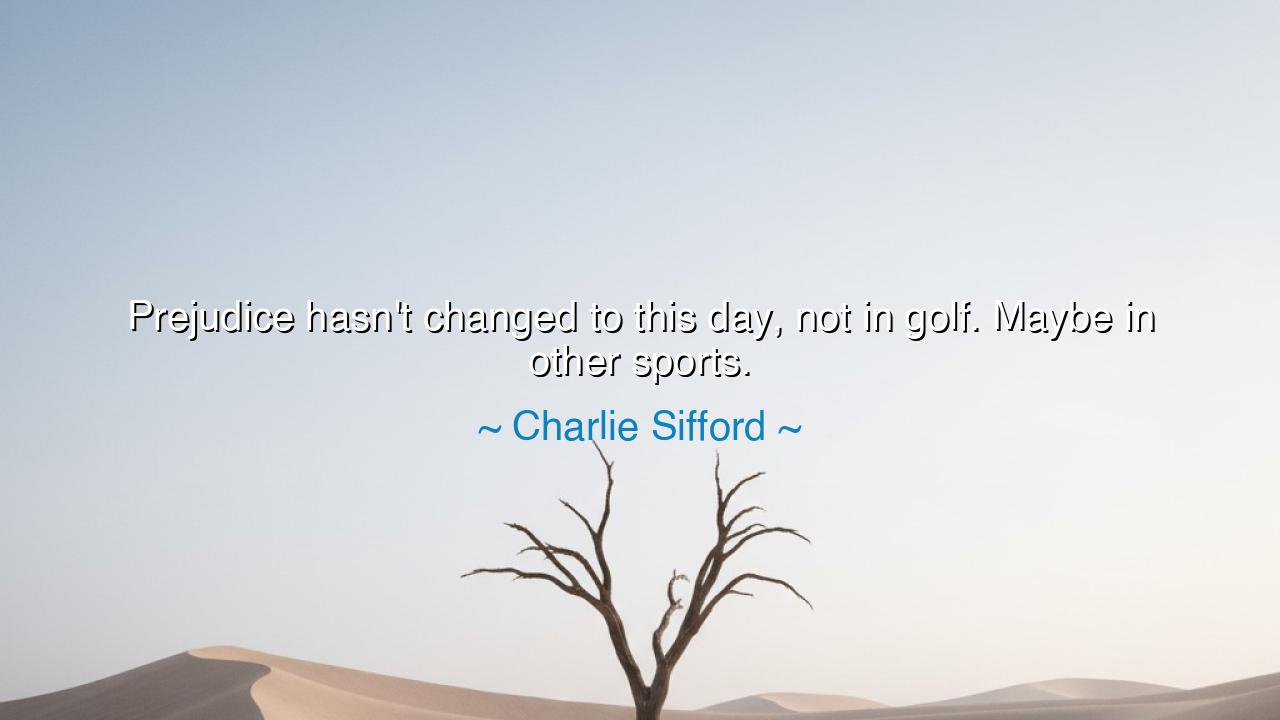
Prejudice hasn't changed to this day, not in golf. Maybe in






Charlie Sifford, the trailblazer who broke barriers in professional golf, once said with solemn honesty: “Prejudice hasn’t changed to this day, not in golf. Maybe in other sports.” These words, born of lived struggle, are not merely a lament but a testimony. They carry the weight of history, the voice of one who faced exclusion yet refused to yield, and the warning that injustice, though challenged, still lingers like a shadow upon the green fields of human endeavor.
In these words, Sifford speaks to the heart of prejudice — that silent poison which endures even when rules are changed, and barriers are supposedly lifted. Golf, with its history rooted in exclusivity, country clubs, and closed circles, resisted integration long after other sports began to open their doors. What Sifford endured was not simply competition, but hostility: taunts, threats, and denials of opportunity, not because of his skill, but because of his skin. His words remind us that while progress is possible, the fight is never complete.
The origin of this truth lies in Sifford’s own life. Known as the “Jackie Robinson of golf,” he became the first African American to earn a PGA Tour card in 1961, after the infamous “Caucasian-only” clause was struck down. Yet even with this victory, he was often denied entry into clubs, forced to endure insults from crowds, and given fewer chances to compete than his peers. Still, he pressed forward, carving his name into history not only with courage but with undeniable talent, eventually winning PGA Tour events and opening the way for others.
History offers parallels. Jackie Robinson broke into baseball in 1947, facing hatred that tested his spirit but never broke his will. Muhammad Ali, in another arena, faced prejudice not only for his race but for his beliefs, standing firm against systems that sought to silence him. In each case, as with Sifford, the arena of sports became more than a game; it became a battlefield where human dignity was tested and defended.
Sifford’s words are powerful because they reveal a dual truth: progress is real, but the roots of prejudice run deep. To say that it remains “to this day” is to remind us that laws and trophies alone cannot erase hatred. True victory is not only winning tournaments but transforming hearts. He invites us to look not just at the scoreboards of history, but at the invisible walls that still divide.
The lesson for us is clear: do not assume the struggle is finished. Each generation must confront its own prejudices, its own hidden barriers, whether in golf, in workplaces, in schools, or in communities. Prejudice changes its form, but it does not vanish unless challenged. To remain silent is to allow it to endure. To act with courage, as Sifford did, is to weaken its grip and make space for justice.
Practical action flows from this wisdom: honor those who broke barriers by continuing their work. Confront prejudice when you see it, even in subtle forms. Encourage inclusivity in places where tradition has long resisted change. And most of all, teach the next generation that greatness in sports, or in life, must be measured not by exclusion, but by the openness to embrace all who have the will to compete.
Thus, Charlie Sifford’s words endure as both a warning and a call to action. Prejudice has not changed to this day, he says — reminding us that the fight is not behind us but around us. Children of tomorrow, remember this: the courage of pioneers is only the beginning. It is for you to carry the flame further, until every field, every course, and every game truly belongs to all.






AAdministratorAdministrator
Welcome, honored guests. Please leave a comment, we will respond soon